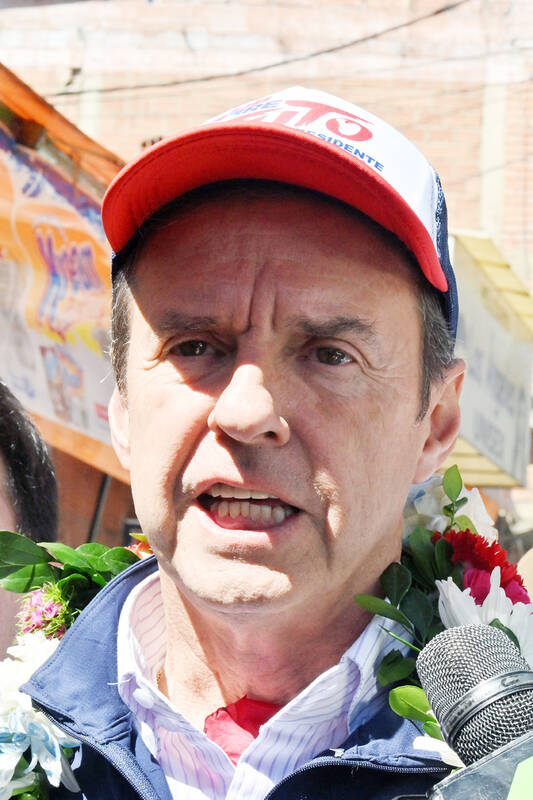One of the frontrunners in Bolivia’s upcoming presidential election, Jorge Quiroga, said that the country was poised for “radical change” after two decades of socialist rule marked in recent years by a severe economic crisis.
Quiroga, who served as president from 2001 to 2002, is running a close second behind business magnate Samuel Doria Medina in polls for the first round of the election on Aug. 17.
The ruling Movement Towards Socialism (MAS), founded by three-term former Bolivian president Evo Morales, is shown at rock bottom, with voters poised to punish the party over its handling of the worst crisis in two decades.

Photo: AFP
Basics like fuel and food items are in short supply in the Andean nation, which is running out of the dollars it needs to import essentials.
After a rally on Thursday with supporters in the administrative capital, La Paz, Quiroga, 65, said that Bolivians faced a period of “radical change [to] regain 20 lost years” — a reference to the Morales era from 2006 to 2019 and that of his successor, Luis Arce, who has been in power since 2020.
Referring to MAS, which was credited with lifting many Bolivians out of poverty during a commodities boom in the 2000s, Quiroga said: “Its cycle is over, its time is up.”
Quiroga, Doria Medina and Bolivian Senator Andronico Rodriguez, who is polling in third, have all prescribed varying degrees of austerity to turn around Bolivia’s finances.
Quiroga, a supporter of Argentine President Javier Milei, has advocated the deepest spending cuts.
Year-on-year inflation rose to 25.8 percent last month, the highest level since 2008, driven by a shortage of dollars, with the US currency having nearly doubled in value against the local boliviano in a year.
Quiroga, a US-educated former finance minister who served as vice president under former Bolivian president Hugo Banzer in the 1990s, said that if elected, he would “change all the laws” to attract investment, including in the energy sector, which Morales nationalized in the 2000s.
He also vowed a change in international alliances, breaking from Venezuela, Cuba and Nicaragua — close allies of the Morales and Arce administrations.
Quiroga was the youngest vice president in Bolivia’s history when he was elected to the post in 1997 at the age of 37. He later served as president for one year after Banzer resigned in August 2001 due to cancer.

Eleven people, including a former minister, were arrested in Serbia on Friday over a train station disaster in which 16 people died. The concrete canopy of the newly renovated station in the northern city of Novi Sad collapsed on Nov. 1, 2024 in a disaster widely blamed on corruption and poor oversight. It sparked a wave of student-led protests and led to the resignation of then-Serbian prime minister Milos Vucevic and the fall of his government. The public prosecutor’s office in Novi Sad opened an investigation into the accident and deaths. In February, the public prosecutor’s office for organized crime opened another probe into

RISING RACISM: A Japanese group called on China to assure safety in the country, while the Chinese embassy in Tokyo urged action against a ‘surge in xenophobia’ A Japanese woman living in China was attacked and injured by a man in a subway station in Suzhou, China, Japanese media said, hours after two Chinese men were seriously injured in violence in Tokyo. The attacks on Thursday raised concern about xenophobic sentiment in China and Japan that have been blamed for assaults in both countries. It was the third attack involving Japanese living in China since last year. In the two previous cases in China, Chinese authorities have insisted they were isolated incidents. Japanese broadcaster NHK did not identify the woman injured in Suzhou by name, but, citing the Japanese

YELLOW SHIRTS: Many protesters were associated with pro-royalist groups that had previously supported the ouster of Paetongtarn’s father, Thaksin, in 2006 Protesters rallied on Saturday in the Thai capital to demand the resignation of court-suspended Thai Prime Minister Paetongtarn Shinawatra and in support of the armed forces following a violent border dispute with Cambodia that killed more than three dozen people and displaced more than 260,000. Gathered at Bangkok’s Victory Monument despite soaring temperatures, many sang patriotic songs and listened to speeches denouncing Paetongtarn and her father, former Thai prime minister Thaksin Shinawatra, and voiced their backing of the country’s army, which has always retained substantial power in the Southeast Asian country. Police said there were about 2,000 protesters by mid-afternoon, although

MOGAMI-CLASS FRIGATES: The deal is a ‘big step toward elevating national security cooperation with Australia, which is our special strategic partner,’ a Japanese official said Australia is to upgrade its navy with 11 Mogami-class frigates built by Japan’s Mitsubishi Heavy Industries, Australian Minister for Defence Richard Marles said yesterday. Billed as Japan’s biggest defense export deal since World War II, Australia is to pay US$6 billion over the next 10 years to acquire the fleet of stealth frigates. Australia is in the midst of a major military restructure, bolstering its navy with long-range firepower in an effort to deter China. It is striving to expand its fleet of major warships from 11 to 26 over the next decade. “This is clearly the biggest defense-industry agreement that has ever